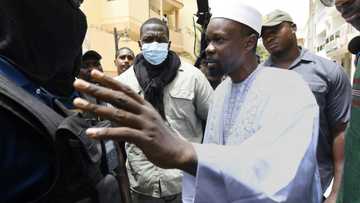Indigenous protesters in Ecuador defy state of emergency

Source: AFP
PAY ATTENTION: Click “See First” under the “Following” tab to see Legit.ng News on your Facebook News Feed!
Indigenous protesters demanding cheaper fuel in Ecuador defied a state of emergency Saturday, pressing on with road blockages now in their sixth day.
A day after President Guillermo Lasso announced the restrictive measures in a bid to end the sometimes violent demonstrations, police said Indigenous people kept up protests in most of the country's 24 provinces, including three where the president declared the state of emergency. One includes the capital, Quito.
Oil producer Ecuador has been hit by rising inflation, unemployment and poverty exacerbated by the coronavirus pandemic.
Fuel prices have risen sharply since 2020, almost doubling for diesel from $1 to $1.90 per gallon (3.8 liters) and rising from $1.75 to $2.55 for petrol.
Demonstrators from the country's Indigenous community -- which makes up over a million of Ecuador's 17.7 million inhabitants -- launched an open-ended anti-government protest this week that has since been joined by students, workers and others.
The demonstrations have blocked roads across the country, including highways leading into the capital Quito.
PAY ATTENTION: Follow us on Instagram - get the most important news directly in your favourite app!
Talks with the president failed to end the demonstrations.
Clashes with security forces during the protests have left at least 83 people injured, and 40 have been arrested.
In response, Lasso's decree empowers him to mobilize the armed forces to maintain order, suspend civil rights and declare curfews.
"I am committed to defending our capital and our country," Lasso said on television.
"I called for dialogue and the response was more violence. There is no intention to seek solutions."
The demonstrations have largely been concentrated in the northern region of Pichincha which includes Quito, and neighboring Cotopaxi and Imbabura.
In Quito, nearly 1,000 protesters tried to tear down metal fences that surround the presidential headquarters this week.
In a bid to ease grassroots anger, Lasso announced in his address late Friday a small increase in a monthly subsidy paid to Ecuador's poorest, as well as a program to ease the debt of those who have loans from state-run banks.
Source: AFP



